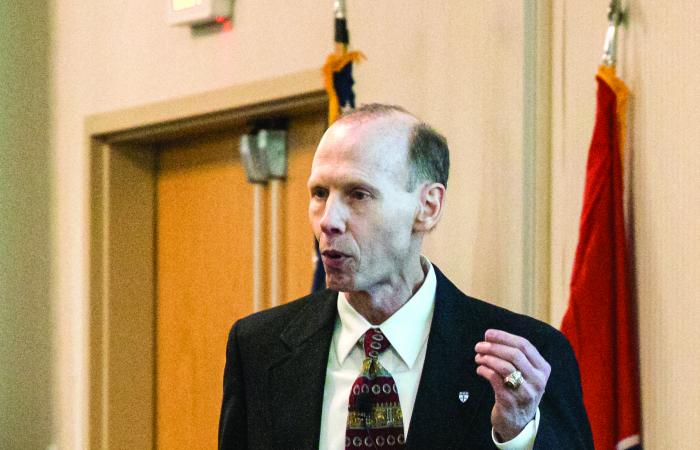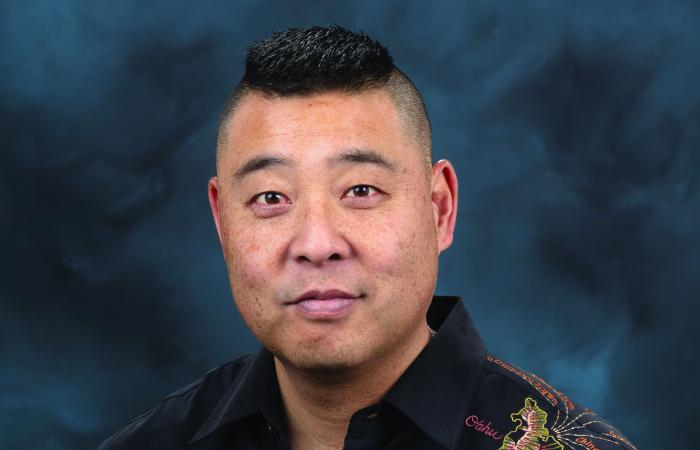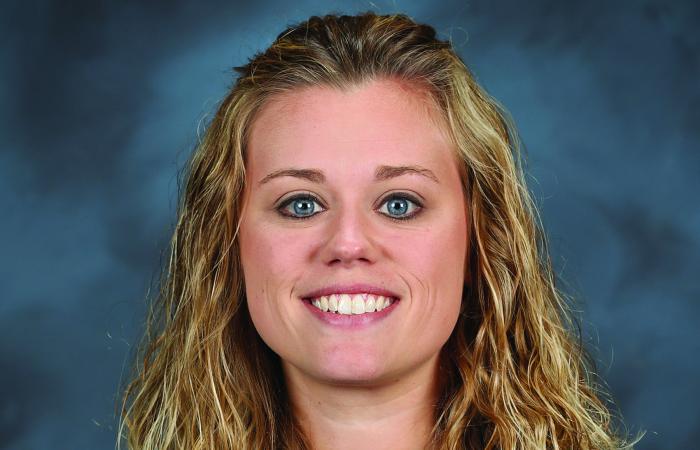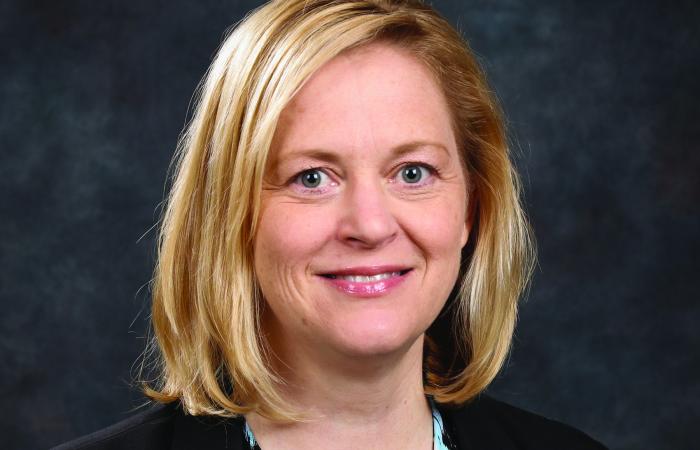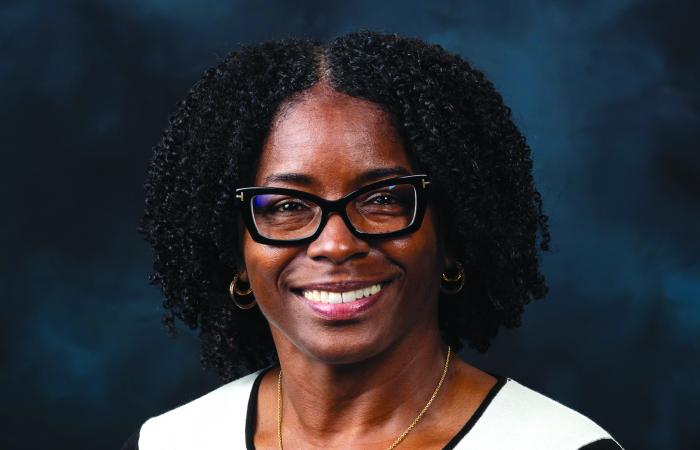ORNL’s world-class researchers get plenty of well-deserved attention, but the lab also owes its success to the people behind the scenes.
It takes hundreds of skilled technicians, craft workers, and administrative personnel to keep the lab’s buildings and utilities well-maintained and available 365 days a year, to attract the best possible new staffers and ensure they hit the ground running, to keep equipment running, respond to emergencies, and pay the bills. Whatever their jobs, ORNL could not get by without them.
ORNL Review sat down with a few of these exceptional supporting players and asked them about their roles and their views on leadership. Unsurprisingly, they stressed the importance of mentoring, and they see a bright future for the lab.
Dr. Bart Iddins: Managing COVID-19 on site
COVID-19 was a new enemy this year, but ORNL Health Services Director Dr. Bart Iddins was already as prepared as possible for a pandemic.
Iddins’s background as a decorated military officer, physician, veterinarian and public health officer plays into how he views his current mission: to ensure COVID-19 doesn’t prevent ORNL staffers from continuing the lab’s missions.
“Before January 2020, my time was divided among health care management and administration, medical program management, occupational risk assessment, occupational health risk surveillance and patient care,” Iddins said. “Since January, my complete focus has been on defending this operation from SARS-CoV-2. I am in full battle mode to defend this nationally important mission and its most important asset, its people, from this deadly virus.”
For Iddins, who joined the lab 18 months ago after retiring from the U.S. Air Force, that means drawing on his medical background, which taught him the importance of considering diseases in terms of not only the health of each individual, but also the health of the entire herd.
It also means making use of his military background, especially combat experience.
“It is clear to me after numerous contingency deployments and combat tours that the key to successful military campaigns is logistics,” Iddins said. “Whether we are talking about procurement of required cleaning supplies, computers for teleworking, COVID-19 test kits, cloth face masks and any number of other necessary supplies and equipment, logistical support is a cornerstone to management of a pandemic at the local, state, national and international levels.”
Another military principle he’s applied to ORNL’s COVID-19 strategy: a layered defense. Working from home, strict social distancing, home quarantine, contact tracing, COVID-19 testing and travel restrictions all are part of ORNL’s in-depth defense, which is evaluated daily, he said.
“The greatest challenge is that many aspects of the pathogenesis of SARS-CoV-2 are unknown,” Iddins explained. “As a result, ORNL’s COVID-19 strategy is in a constant state of adaption as new viral research data becomes available.”
As more employees return to campus, Iddins will continue to evaluate the best courses of protective action.
“I love all aspects of my job in normal times and in these ‘new normal’ times,” Iddins said. “I enjoy being part of this incredible team of like-minded people.”—Kristi Nelson Bumpus
Kory Miike: Great leaders come from great mentors
When you have an organization responsible for 350 research, office and support facilities covering 4 million square feet, you need strong leadership throughout. Fortunately, says Kory Miike, wise leaders can build leadership within their organizations.
Miike, who serves as director of ORNL’s Facilities Management Division, leads a staff of about 300. The division performs facility-related functions ranging from fixing leaky faucets to engineering and installing state-of-the-art equipment for researchers.
According to Miike, the No. 1 job of a leader is to create more leaders.
“Taking quality time to mentor others is necessary for the organization and for its future leaders,” he said.
Miike’s first experience with a strong mentor was nine years ago—four assignments and 15 positions into an Air Force career.
“He took the time to make sure I was fully involved with the issues,” Miike said. “He would say ‘You are coming to this meeting with me; you will see what I see.’ He would bring everyone together to collaborate. He wanted to know our thoughts about the issues.”
Miike came to ORNL in 2016, serving as deputy director and director of the Logistical Services Division before taking the helm at the Facilities Management Division in 2019.
Before joining the lab, he had a fruitful Air Force career in which he eventually became deputy group commander over four squadrons and more than 1,500 personnel at the 305th Maintenance Group at Joint Base McGuire-Dix-Lakehurst in New Jersey. He emphasizes what he calls “the circle of influence” as a key leadership principle.
“You want your circle of influence to be as big as it can be,” Miike said. “You can accomplish more that way. You can grow your circle of influence by how you perform, how your attitude resonates, how you network, and how you respond to people.”
All individuals have a circle of influence that needs to be nurtured, he said.
“When you are out there doing a job, the minute you take a shortcut, your circle of influence shrinks.”—Ed Bodey
Jessica Langstaff: Ensuring utilities are always available
Strong leadership for Jessica Langstaff is about quick decision-making and facing challenges head-on.
Langstaff is an operations manager for ORNL’s Mechanical Utilities Complex, an organization staffed around the clock, 365 days a year, to provide many of the vital utilities—like water and steam—that keep ORNL operating.
“I can receive a call any time, day or night, telling me that we experienced a problem in one of our systems, like a water line break,” Langstaff said. “Our ability to face the issue head-on and to rapidly respond is critical for us in meeting our primary mission of providing uninterrupted service to our research customers.”
The ORNL water distribution system, for example, is essential to the operation of world-class research facilities such as the Spallation Neutron Source, the High Flux Isotope Reactor and the Summit supercomputer. Langstaff’s organization distributes nearly 770 million gallons of water each year to customers throughout the campus. It operates large industrial systems that chill nearly 60 million gallons a year to meet the cooling needs of research facilities and to provide building temperature control.
One incident that required quick decision-making and what Langstaff calls “a head-on response” occurred in 2016, when a 20-inch water main that serves the HFIR complex ruptured, spewing 50 to 75 gallons of potable water a minute.
Langstaff and the Mechanical Utilities team raced to respond, working day and night in harsh winter conditions to repair the leak before water supplies to HFIR were interrupted. Their success prevented a potential reactor shutdown and the interruption of important research activities.
For the 11 years that she has been a member of Mechanical Utilities, Langstaff’s personal leadership philosophy has been to capitalize on lessons learned and the decision-making skills that come with them.
Her leadership philosophy also drives her to spend a significant amount of time in the field, where she experiences the work firsthand. This, she says, allows her to maintain direct and consistent contact with the systems she manages and the highly skilled tradespeople—electricians, millwrights, power equipment operators and others—who perform the hands-on work.—Ed Bodey
Renae Speck: Helping staff prepare for a growing lab
Renae Speck spends much of her time as chief operating officer of DOE’s Center for Bioenergy Innovation at ORNL ensuring that incoming researchers and other staff adjust well to a growing laboratory.
“Rapid growth can potentially introduce confusion and stress,” she said. “We want new staff to be successful. One key to their success is understanding ORNL’s research and safety culture.”
Speck has been at ORNL for over a decade, serving as COO of CBI and as operations director for DOE’s National Alliance for Water Innovation, led by Lawrence Berkeley National Laboratory.
She sees a bright future at ORNL, with researchers increasingly working together under the lab’s “One ORNL” philosophy.
“I see more collaboration now than ever before,” she said. “I think it will continue to strengthen ORNL’s scientific output.”
Speck brings a diverse background to her position. She started at ORNL as a commercialization manager in the Partnerships Directorate and, before that, held positions at Western Kentucky and Vanderbilt universities.
Her wide experience has taught her that leadership isn’t just one style.
Instead, she said, different people require different approaches, and leaders must know when to lead and when to let others lead.
“We need to have multiple styles to adapt to diverse situations,” Speck said.—Clint Keeton
Marilyn Foxall: Helping the next generation
A native Californian with almost 30 years of experience in human resources, Marilyn Foxall agrees that strong mentoring is critical to a successful organization.
Foxall is director of the lab’s Talent Services Division, where she oversees Human Resources managers, business partners and administrators. But when she first started working, she was an emergency room receptionist with dreams of entering the police academy and pursuing a career in law enforcement.
The course of her career changed the day she was asked to answer phones for the hospital’s personnel department.
“Sandra Davis, who was the senior vice president of Human Resources, had been watching me and told me I should be in HR,” Foxall said with a laugh, “but I couldn’t do that. I had other plans!”
Once Davis mapped out her own career and explained what was possible, however, Foxall was persuaded to change those plans, and a decades-long mentorship began.
“Every couple of years, Ms. Davis would call me to check in on me and tell me it was time to move,” Foxall said.
Noting that career advancement wasn’t the only benefit of a good mentor, she added, “The thing about a great mentor is that they will always tell you the truth. Sometimes that truth may be rough, but they will always have the courage to be authentic with you because they care.”
Courage is an aspect of leadership with which Foxall is well acquainted. Ever since she was a little girl, she said, her parents and grandparents—“the village that raised me,” she calls them—have always counseled her to be courageous.
These teachings have served her well in a career that has moved from the private sector to the DOE national laboratory system.
“The No. 1 tenet I step out on every day is courage,” she said. “Everything you do that propels you forward starts with courage.”—Christy White
Gary Worrell: Making sure we attract the best talent
ORNL has many impressive research facilities, notes Gary Worrell, but they can’t reach their potential without skilled scientists, engineers and other staff members. As director of the Talent Acquisition Division, Worrell is deeply involved in making certain ORNL recruits the best possible candidates to fill job openings.
“Research organizations have a lot of great equipment,” Worrell said, “but we need people to use that equipment and publish findings.”
Worrell, who has been in his position about a year, has been working with the lab’s communications organization to establish ORNL’s brand and send the message to researchers that ORNL is an employer of choice. The job takes an A-plus game, given there is steep competition for potential recruits.
One challenge is that private industry is changing.
“More and more organizations are hiring Ph.D.-level talent, beyond just the universities and research institutions,” Worrell said. He noted, for example, that companies such as Google and Amazon are hiring their own Ph.D.-level staff to address data mining challenges.
So far, Worrell’s group has achieved its A-plus game: ORNL hired more people in 2019 than in any other year in its history.
But it’s not just about putting warm bodies in vacant positions. Since his early days as a software sales rep, Worrell has gotten his sense of fulfillment from helping clients reach their goals.
“If I help an organization execute their business plan,” he said, “it’s rewarding to me to be a part of that success.”
And success, says Worrell, is better together. “You can go it alone or you can build a team. In my experience, you’re going to get farther, faster by teaming up.”—Christy White


